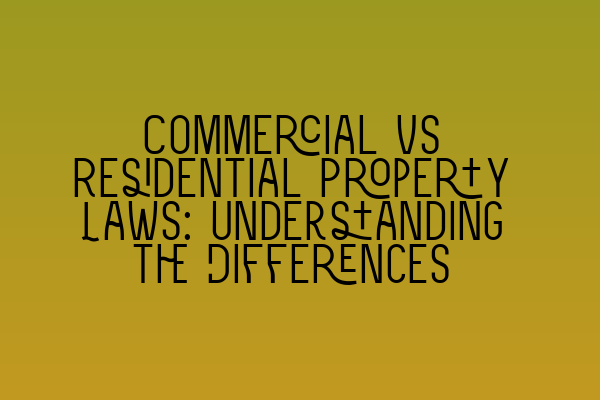When it comes to property law, there are significant differences between commercial and residential properties. Understanding these differences is crucial for property owners, investors, and solicitors dealing with property transactions. In this blog post, we will delve into the various aspects of commercial and residential property laws, highlighting the key distinctions you need to be aware of.
Commercial Property Laws
Commercial properties encompass any buildings or land used for business and profit-making purposes. This includes office buildings, retail spaces, warehouses, and industrial properties. The laws governing commercial properties are typically more complex and detailed than residential property laws, given the commercial nature of these transactions.
One essential aspect that differentiates commercial property laws is the concept of leases. In commercial real estate, long-term leases are prevalent, often ranging from 5 to 10 years or more. These leases are usually negotiated and drafted by solicitors specializing in commercial property law. It is crucial for both landlords and tenants to understand the terms and conditions of the lease, including rent, maintenance responsibilities, and any potential disputes that may arise.
Furthermore, commercial property laws are designed to protect the interests of both parties involved in a transaction. For example, if a tenant breaches the lease agreement, the landlord has the right to terminate the lease and seek remedies for financial losses. On the other hand, tenants have rights in terms of property maintenance, safety standards, and access to necessary amenities.
It is important for solicitors dealing with commercial property to have a comprehensive understanding of the legal framework surrounding these transactions. They need to be familiar with relevant legislation, such as the Landlord and Tenant Act 1954, which regulates leases and security of tenure.
To gain practical knowledge and prepare for a career in commercial property law, aspiring solicitors can benefit from SQE 1 Practice Exam Questions. It provides an opportunity to test their knowledge and familiarize themselves with the types of questions that may arise in the SQE 1 exam.
Residential Property Laws
In contrast, residential property laws primarily concern properties used for dwelling purposes, such as houses, apartments, and condominiums. Residential property transactions tend to be less complex than commercial ones, but there are still important legal considerations to be aware of.
One crucial aspect of residential property laws is the concept of ownership rights. When individuals purchase residential properties, they acquire the freehold or leasehold interests. Freehold ownership grants individuals complete ownership of the property, while leasehold ownership involves a lease agreement with the freeholder for a specific period, typically extending over a term of 99 or 125 years.
Residential property laws also address issues such as property transfers, mortgages, and tenancy agreements. It is essential for solicitors specializing in residential property to guide their clients through these processes, ensuring compliance with relevant legislation and protecting their interests.
Solicitors seeking to enhance their knowledge and skills in residential property law can benefit from SQE 2 Preparation Courses. These comprehensive courses cover the key topics and provide invaluable insights to help solicitors navigate the intricacies of residential property transactions.
Understanding the Differences
While there are some overlapping legal principles between commercial and residential property laws, the key differences lie in their purpose, complexity, and legal framework. Commercial property laws are typically more intricate, negotiating long-term leases and safeguarding the interests of both landlords and tenants. On the other hand, residential property laws focus on ownership rights and facilitating property transfers for dwelling purposes.
As a solicitor dealing with property law, it is crucial to develop expertise in both commercial and residential property. By understanding the nuances of each area, solicitors can provide accurate and effective legal advice to their clients, ensuring smooth and successful property transactions.
For those aspiring to embark on a legal career in property law, it is essential to prepare for the SQE exams. SQE 1 Preparation Courses offer comprehensive guidance to help individuals gain the necessary knowledge and skills to excel in property law. Additionally, staying updated with the SRA SQE Exam Dates ensures that aspiring solicitors are well-prepared and can plan their studies effectively.
In conclusion, commercial and residential property laws differ significantly in their complexity, focus, and legal framework. By understanding these differences, solicitors can navigate the intricacies of property transactions and provide valuable guidance to their clients. Whether you are involved in commercial or residential property, it is crucial to stay abreast of relevant legislation and seek advice from experts in property law.
